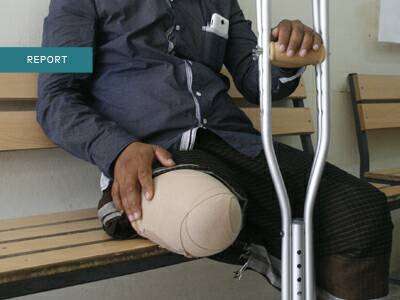
On the International Mine Awareness Day on the danger of landmines, Houthis and Saleh forces must immediately stop using landmines

[fusion_builder_container hundred_percent="no" equal_height_columns="no" menu_anchor="" hide_on_mobile="small-visibility,medium-visibility,large-visibility" class="" id="" background_color="" background_image="" background_position="center center" background_repeat="no-repeat" fade="no" background_parallax="none" enable_mobile="no" parallax_speed="0.3" video_mp4="" video_webm="" video_ogv="" video_url="" video_aspect_ratio="16:9" video_loop="yes" video_mute="yes" video_preview_image="" border_size="" border_color="" border_style="solid" margin_top="" margin_bottom="" padding_top="" padding_right="" padding_bottom="" padding_left=""][fusion_builder_row][fusion_builder_column type="1_1" layout="1_1" spacing="" center_content="no" hover_type="none" link="" min_height="" hide_on_mobile="small-visibility,medium-visibility,large-visibility" class="" id="" background_color="" background_image="" background_position="left top" background_repeat="no-repeat" border_size="0" border_color="" border_style="solid" border_position="all" padding_top="" padding_right="" padding_bottom="" padding_left="" dimension_margin="" animation_type="" animation_direction="left" animation_speed="0.3" animation_offset="" last="no"][fusion_text]
Mwatana Organization for Human Rights said today that Ansar Allah armed group (Houthis) and forces loyal to former Yemeni president Ali Abdullah Saleh must halt harming civilians and immediately stop using and planting of landmines in areas and places that civilians use in Yemen.A new report by Mwatana on the fall of civilian victims by landmines, revealed that landmines planted by Ansar Allah armed group (Houthis), and forces of former president Saleh have killed 57 civilians including 24 children and 4 women, and injured other 47 civilians including 21 children and 6 women, in six Yemeni governorates.The report “Concealed killer” included 33 incidents as samples of landmines explosions onto civilians. Mwatana has verified these incidents through its field researches during the period July 2015 – October 2016, in governorates of Aden, Taiz, Marib, Sana’a, Al-Baydha and Lahj.Radhay al-Mutwakel, chairperson of Mwatana Organization for Human Rights said: “Planting landmines in civilian populated areas is a perfidious killing crime as they take the shape of invisible traps which civilians find difficult to recognize and thus avert them. Houthis and Saleh forces must immediately stop this grave violation and be aware of the exorbitant consequences of planting landmines in civilian areas on the lives of civilians.Findings of Mwatana’s field researches showed that these landmines have caused enormous damages to civilians because they were planted in residential areas, public roads, main streets, homes, farms and crossing places that are daily frequented by civilians. In addition to the killing and maiming for dozens of civilians, these landmines have also caused tens of permanent disabilities among civilian victims particularly children.According to the report, mine-planting operations in populated neighborhoods had taken place during civilians’ displacement due to the armed clashes, but they explode onto them during their return from displacement areas to their homes. Landmines planting operations were extended to the farms and homes of citizens, while Mwatana did not find, in any of the cases, that the party responsible for laying these landmines has drawn the attention of civilians or left warning signals to preclude harm to civilians.“On the International Mine Awareness Day, we recall many civilians killed and injured by landmines in Yemen while thousands of Yemenis are still at risk of landmines and explosive devices that wars left behind without any serious efforts from the warring parties to put an end to this practice and secure the lives of civilians,” al-Mutwakel added.Civilians complained to Mwatana Organization that landmines were planted at the entrances to their homes, considering that Ansar Allah armed group (Houthis) and Saleh forces targeted them because of their refusal to join or to support them in the fighting. In other cases, rains and floods drifted the surface layer of the earth and made the landmines exposed to the tamper by children or passersby, and as well, the floods triggered the movement of landmines from areas of armed confrontations to populated areas.The report mentioned international conventions and treaties that ban the use, stockpiling, production, development and transfer of anti-personnel mines and the destruction of these landmines, whether stored or laid in the ground as stipulated in the Convention on the Prohibition of Anti-Personnel Mines (the Ottawa Convention), signed in September 1997, and ratified by Yemen in September 1998.According to the report recommendations, Mwatana Organization demanded Ansar Allah armed group (Houthis) and forces loyal to former President Ali Abdullah Saleh to immediately stop using landmine of every type in civilian areas, to rapidly disclose the areas where landmines were planted and to fully cooperate with all stakeholders to remove mines planted in non-military areas used or may be used by civilians.Also, Government of President Abdu Rabu Mansoor Hadi, its forces and allied armed groups were called to avoid using and planting landmines, particularly in areas of civilians’ mobility, and to reveal whether the resistance and pro-government forces have planted mines, to disclose their locations, and to immediately clear them.Mwatana Organization for Human Rights reiterates its demand for establishing an international independent mechanism to investigate human rights violations committed by all conflict parties in Yemen.
(Click Here)[/fusion_text][/fusion_builder_column][/fusion_builder_row][/fusion_builder_container]